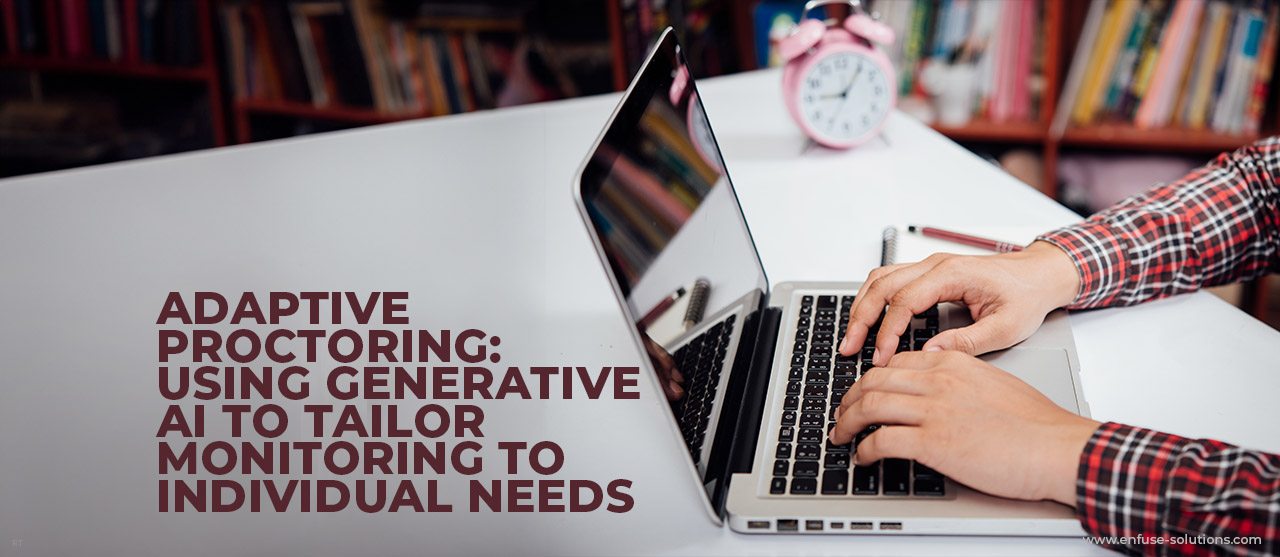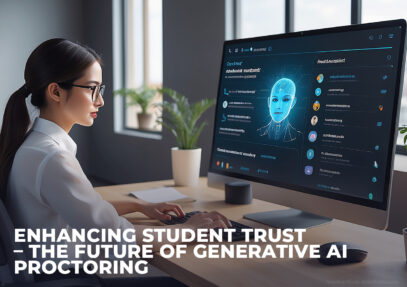
The need for adaptive proctoring is rising in the face of remote learning. Institutions today are keen on harnessing it to create smarter, more efficient systems of monitoring assessments. However, realizing a successful adaptive proctoring setup is not straightforward, for it requires advanced technological interventions. That’s where generative AI (or GenAI) solutions can prove immensely viable.
From adjusting the difficulty of assessments to providing real-time feedback and more, adaptive proctoring backed by GenAI can improve the overall learning and test-taking experience and make it easier for instructors to enhance the overall assessment outcomes.
Generative AI Lays The Foundation For Adaptive Proctoring
Organizations are increasingly embracing GenAI in their strategic initiatives. A recent survey reveals that more than 40% of organizations are already experimenting with GenAI. About 52% of CFOs from these organizations are keen on leveraging GenAI capabilities to lower costs and ensure an improved customer experience. For adaptive proctoring initiatives, GenAI serves to maximize the benefits of monitoring.
It learns from data and can automatically adjust the level of difficulty of assessments to ensure they remain challenging for each learner. It also uses real-time feedback to adjust the assessment based on a student’s demonstrated knowledge or skill gaps, thus allowing an organization to provide customized feedback that students are most likely to act on. Let’s profoundly explore GenAI’s capabilities for tailoring monitoring to individual needs.
How Generative AI Tailors Monitoring To Individual Needs
In the world of assessments, one size doesn’t fit all. That’s where the brilliance of adaptive proctoring comes into play, reshaping the landscape of exam surveillance. Here, we delve into the art of tailoring proctoring to individual needs to ensure a seamless and customized experience for every student.
1. Personalizing Monitoring Parameters
According to McKinsey, 71% of consumers expect personalized interactions, and 76% get frustrated when they don’t receive them. This applies to the education ecosystem as well. No two students are exactly alike. With GenAI, adaptive proctoring can help nurture a personalized monitoring plan for each student.
By analyzing past behavior, performance, and preferences, the system can determine the ideal level of scrutiny required during an exam. The system’s ability to tailor surveillance parameters to individual performance provides the benefits of a custom-tailored exam without the hassle of a physical visit.
2. Adapting To Different Exam Environments
Adaptive proctoring recognizes that exams are conducted in diverse environments. Whether a student is taking an exam in the comfort of their own home or a bustling library, the system dynamically adjusts its monitoring parameters to suit the circumstances.
For example, in a controlled environment like a university campus, the surveillance might focus more on ensuring test-takers don’t use unauthorized materials. Meanwhile, in remote settings, the emphasis may shift towards verifying identity and preventing communication with others.
3. Personalizing Test Taking
Generative AI also offers the capability to tailor the exam format and level based on student’s past performance, real-time engagement, and more. How? Well, it can help:
- Generate more questions around topics where students seem to struggle to better gauge their subject knowledge. Likewise, it can generate more granular and advanced assessments where they seem to perform well.
- Adapt the difficulty of the exam in real-time based on the student’s engagement.
- Monitor students’ behavior to then shape the assessment in a way that better evaluates the capability and knowledge.
- Provide feedback to instructors about the most viable exam formats, levels, etc.
4. Informing New Proctoring Strategies
With GenAI solutions, institutions can optimize their proctoring strategies. The direction of this optimization will depend on the patterns unearthed through the analysis of past proctoring scenarios, outcomes of the assessments, student engagement, etc.
For example, GenAI can propose a fairly new proctoring framework that can effectively help with fraud detection. It can also help document proctoring workflows that ensure better security and privacy of the candidate’s sensitive data. The overarching idea here is to usher in continuous improvement and tweak the workflows that are detrimental to test-taking in any way.
5. Integration With Existing Learning Platforms
Seamless integration of enterprise systems and technologies is critical to the success of adaptive proctoring. The good thing is that educational institutions can seamlessly integrate GenAI solutions with their existing learning management systems (LMS) and assessment platforms. This integration not only simplifies GenAI adoption but also streamlines the overall student and educator experience. It fosters a sense of continuity, making the transition to adaptive proctoring smoother.
Adaptive Proctoring: The Future Of Exam Integrity
Adaptive proctoring using generative AI is a revolutionary new approach to exam integrity. It can tailor monitoring to individual student needs, adapt to different exam environments, and balance privacy and security. However, to fully harness the benefits of adaptive proctoring, it’s essential to equip both educators with the necessary knowledge and skills.
Educators must learn how to effectively use this technology to enhance the assessment process, dispel any misconceptions, and foster a sense of confidence in the system. Besides, what educational institutions need is rigorous technical assistance to realize the full potential of GenAI solutions and keep them updated on the latest advancements in the space.
At EnFuse, we are committed to empowering education through innovative, technology-backed proctoring solutions. Book a strategy call today to learn more about how GenAI-powered adaptive proctoring can uphold academic integrity and facilitate learning in the digital age.

















Comment